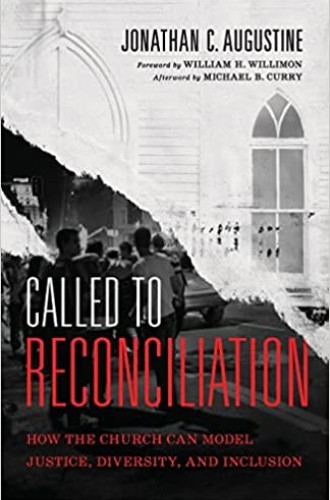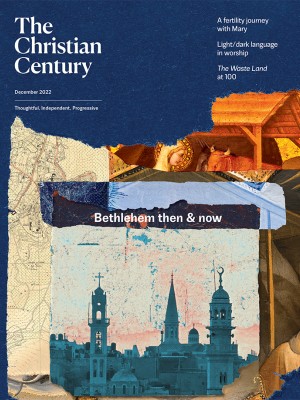Can we be reconciled to God without being reconciled to one another?
Jonathan Augustine starts where Barth left off, moving from salvific reconciliation to social reconciliation.
While there are times when the culture has to catch up with the church, it seems that the reverse is now true. Like the encouraging shouts from the crowd heard by a slowing marathon runner, Jay Augustine’s new book calls out to the church: Set the pace!
Augustine’s message to the American church is that we have been fooled into thinking the United States is a melting pot when we are actually gumbo. “Good gumbo,” he explains, “incorporates difference” without trying to disguise it. This requires addressing our social problems “with honesty, by diverse groups coming together to create something new.” The roux in Augustine’s gumbo recipe is the recognition that reconciliation is possible only if America owns its past and present truth.
Read our latest issue or browse back issues.
Called to Reconciliation is situated within the long tradition of work done by Black pastors outside the White gaze. Augustine taps into the pulpit-based theological and ethical work of pastors like Edward W. Blyden, Martin Luther King Jr., Henry McNeal Turner, and Benjamin Tucker Tanner, situating questions of faith in the social context of race relations. Like Karl Barth’s work, which emerged from the nationalist constructs of his day, Augustine’s articulation of current social and civil realities against the backdrop of salvation is universally applicable. Although many Christians are unaware of the Black pulpit tradition (or choose to ignore it as niche Christianity), Augustine is clearly speaking to the whole church.
When Barth died, he had plans to further develop his doctrine of reconciliation in Church Dogmatics. In a sense, Augustine starts where Barth left off, moving from salvific reconciliation to social reconciliation.
Writing from a Christocentric perspective, Augustine claims that salvific reconciliation brings people salvation through Jesus. This process gives rise to and is deeply involved in social reconciliation because of Jesus’ saving work. Salvific reconciliation is universal, and social reconciliation is what salvific reconciliation looks like on the ground. Salvific reconciliation is theo-doxy and social reconciliation is theo-praxis.
Augustine embeds his anatomy of reconciliation within the narrative of God’s reconciling work attested to in Matthew’s twofold account of the church. Ekklesia means “assembly” or “gathering,” and Augustine cites the first of two Matthean uses of the word (16:18, 18:17) to show that it assumes specifically ethnic diversity: “Jesus, an itinerant Jewish preacher, originally used the term while conversing with Peter, his Jewish disciple, as they entered Caesarea Philippi, a predominantly Gentile area.” Drawing on the scholarship of Donald Senior and Aaron Kuecker, Augustine situates diversity within the context of salvation history. The church began as a Jewish assembly but is destined by God—both through and because of the life, death, and resurrection of Jesus—to be guided by a policy of grafting the stranger into God’s people when determining membership. This engrafting makes forgiveness essential.
Augustine understands that defining ekklesia as a group of ethnically diverse people is not enough to maintain social reconciliation as a priority for the church’s action in the world. If Peter’s leadership in Matthew’s Gospel forms the pillar of diversity that supports reconciliation, Paul’s theology is the second pillar that extends diversity into equality and liberation.
For Augustine, Paul’s theology of baptism makes equality the standard of the church’s reconciling witness to the world. He quotes Corneliu Constantineanu’s observation that “when the Jewish Christians began to return to Rome . . . they found a completely new situation, with Gentile Christians in leadership positions and a life marked by non-Jewish patterns of religious life.” Within this context of fracturing ethnic divisions, Augustine explains, “ethical treatment of ‘the Other’ and leading a new life in Christ through baptism are at the core of Paul’s theology of equality.” Social reconciliation requires not only “equal treatment of others” and forgiveness for their transgressions but also a recognition that this forgiveness is central to the ministry that Jesus left to the church.
Augustine’s call to the church includes a third form of reconciliation that is tied to the other two through forgiveness: civil reconciliation. He writes, “Civil reconciliation—a practical outgrowth of social reconciliation—is a ministry encompassing forgiveness as the church interfaces with the secular world.”
When I encountered this claim, I found myself dissatisfied. I kept wondering: How does this actually work? It was as if I’d tasted the gumbo and realized that an ingredient was missing. Then I recalled King’s assertion that every theology needs a methodology. I kept reading, now looking for a methodology.
Augustine delivers, although not in the way I expected. I anticipated that he would draw upon the civil rights movement’s application of nonviolent direct action. Augustine does mention the methods of King and the civil rights movement, but he makes a stronger connection between civil reconciliation and public policy. Civil reconciliation, he asserts, calls the church to take action in the policy realm. It calls the church to change laws.
This book is far from a sentimental appropriation of lightweight secular appeals to reconciliation. It contains deep social analysis of the rise of Donald Trump as a response to the legal and cultural advances of the civil rights movement and its aftermath. Augustine is clear that any moves toward civil reconciliation demand responses—not only from secular powers but also from the evangelical right. It’s painful to read his analysis of how some US Christians have allowed themselves to be tossed to and fro by every wind of doctrine. Still, like every good preacher, Augustine left me with both a call to action and a recipe for hope.
One of the ways he provides hope is by noting that evangelicals today—just like the Black church of the civil rights era—are not monolithic. Not all evangelicals are Christian nationalists. “Younger evangelicals in particular disagree with Trump’s policies on immigration, his opposition to gay marriage, and his denial of the science evidencing climate change and global warming,” Augustine writes. Many of these Christians would already agree with his claim that “we are called to reconciliation, with the church leading the way as a model for justice, diversity and inclusion.”
Still, hearing a call and fulfilling it are not the same. Augustine concludes: “The work of reconciliation is not easy. It remains a destination on the horizon. However, by putting theory into practice, it is indeed possible to move the church toward reconciliation.” If we are going to set the pace, it will help that our bellies are filled with God’s good gumbo.






